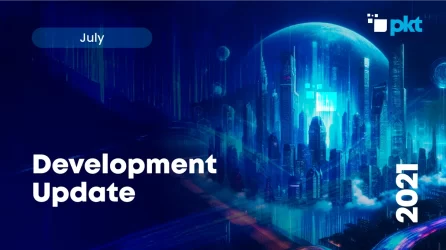
The July 2021 development update coincides with numerous milestones, including the PKT blockchain crossing the 1 millionth block, the completion of the 7th decimation, and milestone achievements for the PKT Network sustained bandwidth and encryptions per second.
PKT is an open-source project. All of the PKT blockchain code and the various projects being developed in the ecosystem are managed by contributing community members.
The PKT blockchain continues to show robust growth, generating sustained bandwidth over 9 gbps, as visible on the PKT explorer. When surveying individual blocks, bandwidth is consistently between 10-50 gbps, with recurring peaks between 70-120 gbps.
Encryptions per second are sustained between 5-10 million per second, with peaks over 30 million per second. Mining difficulty has increased dramatically, growing from 6 million in June, to 9.85 million at the time of writing. This is an increase of 1,000x since January, 2021.
The PKT Network also experienced its 7th decimation; the decimation occurs every 100 days, and reduces the block reward by 10%. The 7th decimation occurred on Sunday July 11, 2021 at block 1,008,000, reducing 60 second block rewards to 1,992.58 PKT.
PKT has attracted a devoted and growing mining community, with PacketCrypt mining occurring on 6 out of 7 continents. There are currently 3 well-equipped mining pools and at least 2 known pools in development. The first of two notable contributions was made by community member Devious0.
The push changed the miner to use faster versions of the chacha20 and poly1305 encryption algorithms used in the miner. Announcement miners in the community have reported consistent 2-2.5x increase in bandwidth and encryptions per second output.
This PacketCrypt update has been attributed to an approximate 30% increase in mining difficulty since its launch on June 25, 2021. The second significant update was contributed by community member Thierry Marianne, who added automated builds for Windows, Mac and Linux so that people do not need to compile PacketCrypt manually.
There are numerous wallet projects that are currently under development in the PKT ecosystem. The MatterFi wallet, which is being developed under the Double Wallet network steward project, is currently in alpha testing for Linux and Mac OS, with a Windows release expected soon.
The project is active on the public PKT Chat #matterfi-wallet channel. Numerous community members have installed the wallet on Linux and Mac and have contributed to providing testing and feedback. The MatterFi wallet will push into beta testing in July 2021, with the addition of segwit compatibility for pkt1 addresses.
Segwit will enable users to restore both command line wallet (CLI) and Zulu wallet seeds on the MatterFi wallet. Upon final release, the MatterFi wallet will have functionality to store BTC, BCH and LTC, use Open Transactions notaries, BIP 47 universal payment addresses with secure in-app messaging and an updated polished UI.
Community member company PKT Pal has begun development on a PKT mobile wallet. This is a cross-platform smartphone wallet, which is being written in React Native so that it can be deployed on iOS and Android simultaneously. The project is fast tracked for a Q3 2021 beta release.
The Anodium VPN Network Steward project has been making strides towards public alpha testing. The project includes a mobile wallet that executed the first PKT transactions using the lightning network. This is an enormous milestone for the PKT project, because microtransaction functionality is required for bandwidth leases to be transacted in the PKT Network.
These wallet developments are separate from the PKT Electrum, Zulu Wallet, and the CLI wallet, which are currently available to the community.
The Wrapped PKT team has finally publicly shared details on the Obeah Bridge, which will connect PKT to WPKT. The bridge is not currently live yet. The initial plan was to debut on Uniswap, however, the WPKT team ran into a scalability problem using Chainlink as an oracle.
Since Chainlink is a token built on Ethereum, gas fees must be paid to both Ethereum and Chainlink. Due to the Obeah Bridge’s projected high transaction volume, there was considerable risk for unstable and untenable ETH and LINK fees. The WPKT team has now pivoted towards Binance Smart Chain (BSC), where fees are substantially lower.
Using BSC, WPKT liquidity pools will earn BNB, and gas will be paid with Cake. WPKT is anticipated to launch as a BEP20 token on Pancake Swap, with wallet functionality using Metamask.
This will provide the first mobile wallet functionality for the PKT ecosystem. The WPKT smart contract and bridge is currently being updated and tested. A launch date will be announced imminently.
The TokenStrike project officially commenced development on May 24, 2021. Due to the complexity of finding a team who could execute on Caleb’s vision for a token issuance platform with near zero cost issuance and no gas fees, this project was awarded by the Network Steward project with a 0 PKT commencement payment.
Community member company Anode is partnered on this project with community member Alex Lightman and his development team to build Token Strike.
The development entails 4 milestones to be delivered during the calendar year of 2021. The first milestone will include the ability to send and receive TokenStrike tokens, as well as an update to PacketCrypt that allows listening to pool servers for particular announcement types.
TokenStrike is the backbone technology for issuing a bandwidth trading marketplace, so anyone can tokenize bandwidth and buy/sell bandwidth leases using lightning network microtransactions. Token Strike will also enable the issuance of NFTs without gas fees.
As of June 27, 2021, the final milestone of the project cjdns using Wireguard for encryption has been accepted by the Network Steward. The code for cjdns + Wireguard is now in testing in a branch of cjdns.
This is a very important milestone because it updates the encryption technology used in cjdns to a more modern encryption handshake and also switches cjdns to the chacha20 algorithm, the same algorithm used in PacketCrypt. Caleb has posted part 1 of a 3 part series here , which outlines the innovations of this technology.
The first edge point device, called the PKT Cube, went on sale today from community member company PKT Pal. This device is powered by the AMD Ryzen 9 5950x and integrates multi-pool PacketCrypt mining and a hardware CLI wallet via a custom operating system called PkteerOS.
The device enables users to securely pair their hardware wallet with their mobile phone and/or desktop computer using a cryptographic key, so payments can be remotely made from a computer or mobile phone using a digital handshake.
The PKT Cube and PkteerOS is designed to eventually perform all of the functions of an Edge Point device in the PKT Network, including Wifi Sharing and VPN functionality, when the Anodium VPN Network Steward project is completed.
Milestones 1 and 2 have been accepted on the Network Steward project Anodium VPN. The project is actively working on Milestone 3 in the public PKT Chat #anode-vpn channel.
The scope of this project is vast, but in summary, an android app has been developed, and a new Android APK has been released that lets a user manage their account and connect to a PKT VPN server for secure surfing.
In testing, phone calls have been made over this PKT VPN, and a Lightning Network integrated PKT wallet is currently sending and receiving PKT. REST API and account authorization using the cjdns keys is available on the android app, which enables PKT VPN to provide VPN access to users who don’t want to provide potentially sensitive information such as their name, email, or phone number. Milestone 3 will be earmarked by a user having the ability to connect to a VPN and route traffic through the cjdns network.
An enormous project called Open source high performance cjdns Route Server has been delivered and accepted by the Network Steward. This project was overseen by Alex Lightman and his development team, and entailed implementing cjdns in Rust, including rust versions of cjdnsnode, cjdnsadmin, cjdnsann, cjdnskeys, cjdnsniff, and cjdnsplice, as well as an array of libraries, binaries and features that are necessary for PKT’s vast synergies with cjdns’ compact source routing technology. This project’s importance cannot be understated, as it provides the critical functionality needed for the Cloud ISP technology described in the PKT Network whitepaper.
Another community member supported project is the first fork of the open-source PKT Explorer backend with added functionality to discern which percentage of blocks are won by each mining pool, showing how many blocks are mined per hour, as well as the ability for miners to check their wallet address yields from each mining pool.
The PKT World explorer is maintained by the PKT World mining pool, and has provided ease of visibility into the block explorer. PKT World is also planning to release a new Windows desktop wallet app with a built-in PKT cash miner.
The Community Project was approved by the Network Steward in late November 2020, with a mandate to provide technical documentation on docs.pkt.cash, launch a blog on crypto.pkt.cash, oversee pkt.cash website updates, article and blog writing, explainer video creation, translations of the whitepaper and website in 4 languages, including Chinese, Russian, Japanese, and Korean, and graphic illustrations to help communicate the major concepts of the PKT project.
The language translations and explainer video are the last deliverables to be finalized over the coming month. The Community Project was supposed to end in March 2021, however the team of community members on the project expanded the scope to manage the ongoing growth and expansion of the PKT project as a community funded effort.
A team of community members has been corresponding with the Top 15 CEX about listing PKT. A listing is now confirmed and forthcoming. However exact listing details can only be provided when the listing team has confirmation of the technical integration of the PKT blockchain and is provided a greenlight for a public announcement. Stay tuned.
These are very exciting times for the PKT project. With open source projects, there are many inherent challenges due to the decentralized development, and community-based management of the roadmap and communications. However, the future is very bright for this project. Thank you for everyone’s support.
Until next time.
Jesse Berger
Community Member
Go back to Blog →
Announcements
The world of blockchain and cryptocurrency is often marked by moments of triumph and innovation, but sometimes, even the most meticulously planned operations can face unexpected challenges…

Blockchain & Internet Decentralization
In this age where just sending a tweet can be a revolutionary act, the PKT project is set to revolutionize internet connectivity. We’re talking about a new reality where internet…